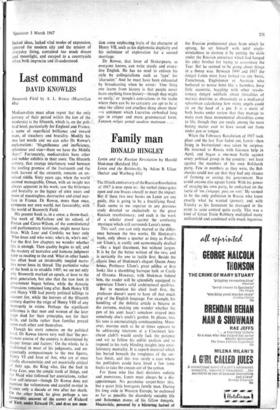Last command
DAVID KNOWLES
Bosworth Field by A. L. Rowse (Macmillan 45s)
Mediaevalists must often regret that the only century of their period within the ken of the modernist is the fifteenth, which is, on the poli- tical level, particularly for England and France, a scene of superficial brilliance and inward want, of treachery and brutality. Modify his two last words and we can echo Dr Rowse's exclamation: 'Magnificence and inefficiency, splendour and vice—there we have the Middle Ages!' Fortunately, mediaevalists have other and nobler exhibits in their store. The fifteenth century, that strange interlunary void between the jostling promise of the fourteenth and the rank harvest of the sixteenth, remains an un- solved riddle. Sixty years ago, when the world seemed manageable, Oman, with an insight not always apparent in his work, saw the bitterness and brutality as the legacy of sixty years and more of meaningless, destructive and cruel war- fare in France. Dr Rowse, more than once, compares our own world, not favourably, with the world of Bosworth Field.
His present book is, in a sense, a throw-back. The work of McFarlane and his school, of Postan and Carus-Wilson, of the constitutional and parliamentary historians, might never have been. With Lear and Cordelia we hear only `Who loses and who wins; who's in, who's out.' For the first few chapters we wonder whether this is enough. Then quality begins to tell, and the mastery of narrative and humane judgment keep us reading to the end. What in other hands has often been an intolerably tangled narra- tive never loses its thread. The particular value of the book is to straddle 1485; we see not only why Bosworth marked an epoch, at least to the next generation, but also that the new look in government began before, while the dynastic obsessions remained long after. Both Henry VII and Henry VIII had purely political killings to account for, while the horrors of the fifteenth century deprive the reign of Henry VIII of any monopoly in crime. Perhaps the significant difference is that men and women of the later reign died for their principles, not for their birth, and faiths rather than families preyed upon each other and themselves.
Though his story remains on the political level, Dr Rowse knows very well that 'the per- manent course of the country is determined by deeper forces and factors.' On the whole, he is traditional in most of his judgments, and un- expectedly compassionate to the two figures, Henry VI and Joan of Arc, who are at once wholly characteristic and yet essentially critical of their age, the King who, like the fool in King Lear, sees the simple truth of things, and the Maid who followed her convictions, rather than self-interest—though Dr Rowse does not mention the voluminous and careful re-trial in France only a decade or two after her death. On the other hand, he gives perhaps a too favourable account of the career of Richard of York under Edward IV, and does not men- tion some unpleasing traits of the character of Henry VII, such as his diplomatic duplicity and his technique of exploration for a second marriage.
Dr Rowse, that lover of Shakespeare, as everyone knows, can write sturdy and evoca- tive English. He has no need to enliven his style by colloquialisms such as 'type' for `character.' And he must have been exhausted by broadcasting when he wrote: 'One thing one learns from history is that people never learn anything from history—though they might so easily,' or 'people's convictions in the realm where there can be no certainty are apt to be at once the silliett and cruellest thing about them' —a sentiment which Lucretius embodied long ago in crisper and more grammatical form. Taniuni religio potuit suadere malorum . . .


































 Previous page
Previous page